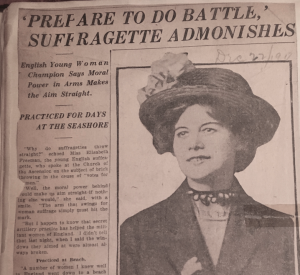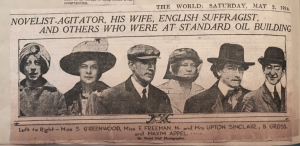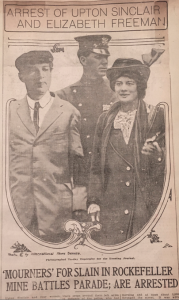
LABOR ACTIVISM

In 1909, there had been strike of 20,000 garment workers, and then a subsequent one in early 1913. EF and other labor leaders and celebrities joined the picket lines for the strikers, attracting attention to the plight of mostly Italian and Jewish immigrant workers. And got arrested.
Another abuse of workers came to light and EF was drawn to that cause as well. This was a domestic massacre resulting from strike-breaking. The Colorado National Guard and guards of Colorado Fuel and Iron Company, owned by Rockefeller, attacked a tent colony of 1,200 striking coal miners and their families in Ludlow, Colorado, on April 20, 1914, with the National Guard using machine guns to fire into the colony.

ANTI-LYNCHING
Roy Nash of the NAACP asked Freeman to “get the facts for us” about a lynching in Waco Texas. The NAACP was founded only 7 years earlier and was a fairly small organization composed of mostly white people. The leaders felt that they needed a detailed account of a lynching that could then be used to raise awareness, funds, and membership.
Freeman provided that account. She obtained photos, quotes, and facts about the horror. Her work was used in publicizing the problem of lynching which, according to this brochure, claimed the lives of “80 American citizens” in 1915 alone.
She subsequently was hired to travel on 2 anti lynching tours all over the country. At every stop, she organized meetings, met local leaders, gave passionate speeches, and raised funds. As we would say today, her “intel” helped the NAACP grow its membership and its reputation and much needed $10,000 to bring the lynching problem to the public’s attention.
THE FIRST WOMEN’S POLITICAL CAMPAIGN
As soon as her second tour ended, Freeman received a letter from Frances Kellor inviting her to be on the Hughes Campaign Train. Kellor was a labor organizer who subsequently went on to become the first female Cabinet member as Roosevelt’s Labor Secretary. Charles Evans Hughes was favored to beat Wilson but lost narrowly. Unlike Wilson, Hughes was for women’s suffrage and had a better record than Wilson on civil rights. Wilson, in a bid for Southern votes, wanted to replace black civil service workers with Southern Democrats.
The “Hughes Special” traveled all across the US and it was the first time women were used in electoral politics. There were many wealthy women on board but also many working class organizers but it was still dubbed the “Golden Special”. EF’s role was to speak to black audiences where men, and in some states women, already had the vote.
PEACE
By late 1916 and early 1917 the US was being dragged into WWI and Freeman was hired as a lobbyist for the Emergency Peace Federation and later as an a organizer for the People’s Council. Although she never worked for suffrage again, while she was in Washington she joined the picket line at the White House. Several women from the Congressional Union (Alice Paul’s group) were arrested and when arrested, went on hunger strikes.
For more information about Elisabeth Freeman go to www.elisabethfreeman.org
including a new blog feature.
